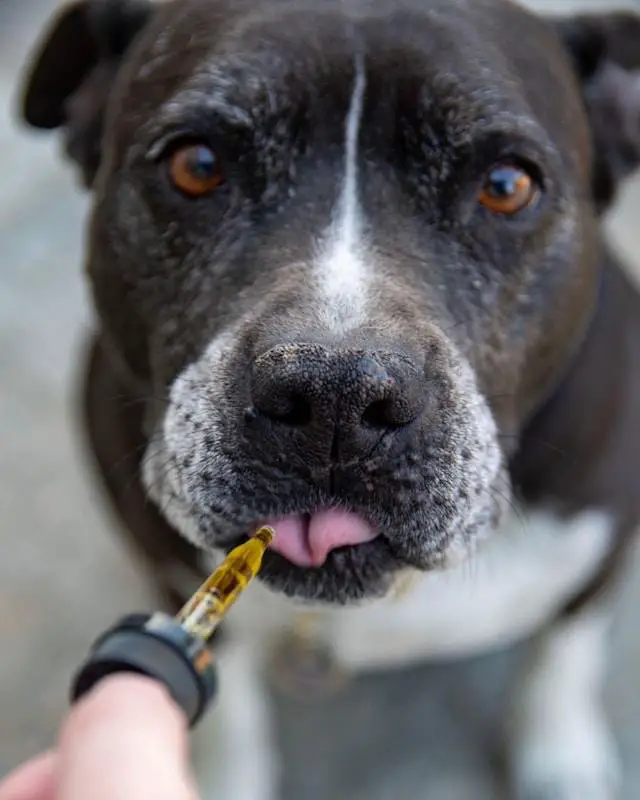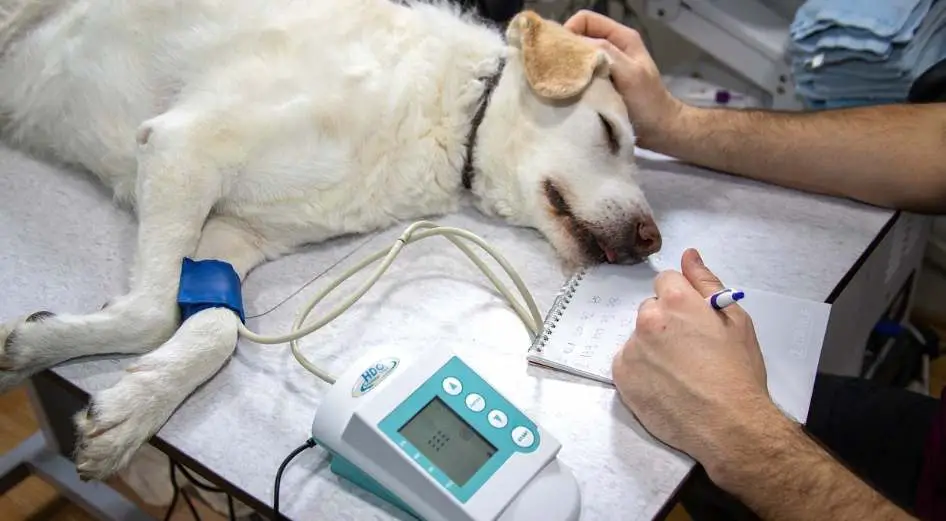12 Potential Causes of Dog Vomiting Blood

Today, let’s dive into a concerning topic that no one likes to see: dog vomiting blood.
It’s a distressing sight, but fret not, because in this article, we’ll explore the possible causes, when to seek veterinary help, and what you can do at home to help your furry friend.
So, grab a cup of coffee and let’s get started on this important discussion!
Dog Vomiting Blood
Vomiting blood, known as hematemesis, in dogs can indicate several serious underlying health issues. These may include gastrointestinal ulcers, ingestion of foreign objects, pancreatitis, or a clotting disorder.
Immediate veterinary attention is crucial to diagnose the cause and provide appropriate treatment to ensure your dog’s well-being.
Avoid delay in seeking professional help to address this potentially life-threatening condition for your dog.
Let’s break it down further…
Potential Causes of dog vomiting blood

Here are some of the potential causes of dog vomiting blood:
1. Ingestion of foreign objects
One common cause of dog vomiting blood is the ingestion of foreign objects.
Dogs are curious creatures and may often swallow items they shouldn’t, such as small toys, socks, or even sharp objects.
These objects can cause irritation or damage to the gastrointestinal tract, leading to bleeding and subsequent vomiting of blood.
To manage this, it’s important to seek veterinary attention immediately.
The vet may need to perform an X-ray or endoscopy to locate and remove the foreign object.
Prevention is key here, so make sure to keep potentially harmful items out of your dog’s reach.
Learn more about dogs vomiting undigested food.
2. Gastrointestinal ulcers
Gastrointestinal ulcers can also lead to dog vomiting blood.
Ulcers are open sores that can develop in the stomach or intestines due to various reasons, including certain medications, infections, or underlying health conditions.
When these ulcers bleed, the blood can mix with stomach acid and cause vomiting of blood.
If your dog is experiencing this, it’s crucial to consult a veterinarian for appropriate diagnosis and treatment.
Treatment may involve medication to reduce stomach acid, antibiotics to treat any underlying infection, and dietary changes to promote healing.
3. Poisoning
Another serious cause of dog vomiting blood is poisoning.
Dogs are naturally curious and may ingest toxic substances such as human medications, household chemicals, or certain plants.
These toxins can damage the gastrointestinal tract, leading to bleeding and vomiting blood.
If you suspect poisoning, it’s essential to act quickly and contact a veterinarian or a pet poison hotline for guidance.
The veterinarian may induce vomiting or administer activated charcoal to help absorb the toxins.
Preventing access to toxic substances is crucial to avoid such situations.
Learn more about dogs vomiting white foam.
4. Gastrointestinal infections
Gastrointestinal infections can also cause dog vomiting blood.
Bacterial, viral, or parasitic infections can lead to inflammation and damage to the gastrointestinal lining, resulting in bleeding.
These infections can be caused by contaminated food or water, exposure to other sick animals, or poor hygiene.
If your dog has bloody vomit along with other symptoms like diarrhea or lethargy, it’s important to consult a veterinarian for diagnosis and treatment.
Treatment may involve medications to combat the infection, fluids to prevent dehydration, and supportive care to aid recovery.
5. Liver disease
One possible cause of dog vomiting blood is liver disease. The liver plays a crucial role in filtering toxins from the bloodstream.
When the liver is affected by disease or damage, it may lead to bleeding in the gastrointestinal tract. This can result in blood being vomited by the dog.
To manage this condition, it’s important to consult a veterinarian who can diagnose the specific liver disease and create a treatment plan.
This may involve medication, dietary changes, and sometimes even surgery. Regular monitoring of the dog’s liver function is crucial to ensure the effectiveness of the treatment.
To prevent liver disease, it’s important to maintain a healthy lifestyle for your dog.
Provide a balanced diet, regular exercise, and prevent exposure to toxins or harmful substances that may damage the liver.
6. Toxic ingestion
Another cause of dog vomiting blood can be toxic ingestion.
Dogs are curious creatures, and they may ingest substances that are toxic and harmful to their bodies.
These toxins can irritate the gastrointestinal tract, leading to bleeding and subsequent vomiting of blood.
If you suspect toxic ingestion, it’s crucial to seek immediate veterinary attention.
The veterinarian will assess the situation, possibly induce vomiting to remove the toxin, and administer appropriate treatment.
It’s important to be vigilant and keep hazardous substances out of your dog’s reach to prevent such incidents.
Learn more about dogs vomiting clear liquid.
6. Clotting disorder
Clotting disorders, such as hemophilia or von Willebrand disease, can also lead to dog vomiting blood.
These disorders affect the blood’s ability to clot properly, leading to bleeding in various parts of the body, including the gastrointestinal tract.
Management of clotting disorders primarily involves working closely with a veterinarian and following their recommended treatment plan.
This may include medication, blood transfusions, or other interventions to improve clotting function.
Regular check-ups and monitoring are vital to ensure the dog’s well-being.
Prevention of clotting disorders in dogs largely relies on responsible breeding practices.
If you’re considering getting a dog, it’s important to research the breed and its potential genetic predisposition to clotting disorders.
Breeders should take measures to avoid breeding dogs with known clotting disorders to reduce the risk for future generations.
8. Pancreatitis
Pancreatitis can also be a cause of dog vomiting blood.
Pancreatitis is the inflammation of the pancreas, which can lead to bleeding in the gastrointestinal tract.
It can be triggered by various factors, including a high-fat diet, certain medications, or underlying health conditions.
Managing pancreatitis involves working closely with a veterinarian to develop a treatment plan tailored to the dog’s specific needs.
This typically includes dietary changes, medications to reduce inflammation, and sometimes hospitalization for more severe cases.
Regular check-ups and monitoring are important to prevent recurrence and manage the dog’s overall health.
To prevent pancreatitis, it’s crucial to provide a balanced diet for your dog and avoid feeding them high-fat foods.
Additionally, it’s important to be cautious with medications and consult a veterinarian before administering any new medications to your dog.
Learn more about dog vomiting and shaking.
9. Hemorrhagic gastroenteritis (HGE)
HGE is a condition that affects the gastrointestinal tract and can cause severe vomiting and bloody diarrhea in dogs.
The exact cause of HGE is unknown, but it is believed to be related to a combination of factors, including stress, dietary changes, and bacterial infections.
It primarily affects small to medium-sized dog breeds.
When it comes to managing HGE, it’s crucial to seek veterinary attention immediately.
Your vet may recommend intravenous fluids to rehydrate your dog, antibiotics to treat any potential bacterial infection, and medications to control vomiting and diarrhea.
In severe cases, hospitalization may be necessary.
To prevent HGE, it’s important to maintain your dog’s overall health and well-being.
Avoid sudden changes in diet, provide a balanced and nutritious diet, and minimize stressors in your dog’s environment.
10. Inflammatory bowel disease (IBD)
IBD is a chronic condition characterized by inflammation in the lining of the digestive tract.
It can cause symptoms such as vomiting, diarrhea, and bloody stools.
The exact cause of IBD is unclear, but it is believed to be related to an abnormal immune response to certain dietary or environmental factors.
Management of IBD involves working closely with your veterinarian to develop a comprehensive treatment plan.
This may include dietary modifications, such as a hypoallergenic or novel protein diet, medications to reduce inflammation, and occasionally, immunosuppressive drugs.
Preventing IBD in dogs is challenging since the exact cause is unknown.
However, providing a high-quality diet, avoiding unnecessary dietary changes, and minimizing exposure to potential triggers may help reduce the risk.
11. Cancer
Cancer can affect various organs in a dog’s body, including the digestive system.
Tumors in the stomach, intestines, or other parts of the gastrointestinal tract can cause vomiting blood.
The management of cancer in dogs depends on the type, location, and stage of the disease.
Treatment options may include surgery, chemotherapy, radiation therapy, or a combination of these.
It’s essential to consult with a veterinarian who specializes in oncology to determine the best course of action for your dog.
Preventing cancer is challenging, but some general recommendations include maintaining a healthy weight, providing a balanced diet, regular exercise, and minimizing exposure to environmental toxins.
12. Parasites
Certain parasites, such as hookworms, whipworms, or roundworms, can cause gastrointestinal bleeding in dogs.
These parasites can damage the lining of the digestive tract, leading to vomiting blood.
To manage parasitic infections, your veterinarian may recommend deworming medications specific to the type of parasite involved.
Preventative measures, such as regular fecal examinations and routine deworming, can help reduce the risk of parasites in dogs.
Preventing parasitic infections in dogs involves practicing good hygiene and sanitation, keeping your dog’s living area clean, and avoiding contact with contaminated soil or feces.
How to diagnose vomiting blood in dogs

When it comes to diagnosing vomiting blood in dogs, it’s crucial to act swiftly and seek immediate veterinary care.
The most effective way to diagnose this condition involves a combination of physical examination, blood tests, imaging studies, and endoscopy.
During the physical examination, the vet will assess the dog’s overall health, check for signs of bleeding or abnormalities, and listen to the abdomen for any unusual sounds.
Blood tests can help identify underlying causes such as liver or kidney disease, while imaging studies like X-rays or ultrasounds can provide a more detailed view of the internal organs.
Endoscopy, using a flexible tube with a camera, allows the vet to directly visualize the esophagus, stomach, and upper intestines for any signs of bleeding or lesions.
Remember, early diagnosis is crucial for the well-being of your furry friend.
Treatment options for dogs vomiting blood

When it comes to dogs vomiting blood, it’s crucial to seek immediate veterinary attention.
The most effective treatment options depend on the specific diagnosis, so a thorough examination and diagnostic tests are necessary.
Treatments may include supportive care such as intravenous fluids to maintain hydration, medications to control vomiting and promote healing, and blood transfusions if necessary.
In some cases, surgery might be required to address the underlying cause.
Let’s break it down further…
Here are some common treatment options for dogs vomiting blood:
1. Fluid Therapy: One of the first steps in treating dogs vomiting blood is to stabilize their fluid levels. Intravenous fluids may be administered to help restore hydration and replace any lost blood volume. This can help support the dog’s overall health while further diagnostics are performed.
2. Medications: Depending on the underlying cause, your veterinarian may prescribe medications to address the specific issue. For example, if the vomiting is caused by an infection, antibiotics may be prescribed. Antiemetic medications can also be used to help control nausea and vomiting.
3. Dietary Changes: In some cases, adjusting the dog’s diet can provide relief. This may involve feeding a bland diet or switching to a specialized prescription diet that is easier to digest. Your vet can recommend the most appropriate dietary changes based on the dog’s specific needs.
4. Surgery: In more severe cases, surgery may be necessary to address the underlying cause of the vomiting. This could involve removing foreign objects, repairing an injury, or treating a gastrointestinal condition. Your vet will determine if surgery is the best option for your furry friend.
5. Supportive Care: Dogs vomiting blood may require additional supportive care to aid in their recovery. This can include providing a calm and stress-free environment, ensuring they have access to fresh water, and monitoring their overall well-being. Regular check-ups with the vet are essential to track progress and make any necessary adjustments to the treatment plan.
Remember, every situation is unique, and the treatment options may vary depending on the underlying cause.
FAQs
Is it normal for a dog to vomit blood?
No, it is not normal for a dog to vomit blood. Vomiting blood, also known as hematemesis, can be a sign of a serious underlying health issue and requires immediate veterinary attention.
What could be causing my dog to vomit blood?
There are several potential causes for a dog to vomit blood, including gastrointestinal ulcers, ingestion of foreign objects, infections, liver or kidney disease, cancers, and blood clotting disorders. A thorough examination by a veterinarian is necessary to determine the underlying cause.
Can I treat my dog’s vomiting blood at home?
It is not advisable to attempt home treatment for a dog vomiting blood. Vomiting blood can be a symptom of a life-threatening condition, and only a veterinarian can properly diagnose and provide appropriate treatment.
How is vomiting blood in dogs diagnosed?
To diagnose the cause of vomiting blood in dogs, a veterinarian may perform a physical examination, blood tests, imaging studies (such as X-rays or ultrasounds), and may recommend additional diagnostic procedures if necessary, such as endoscopy or biopsy.
What should I do if my dog vomits blood?
If you notice your dog vomiting blood, it is crucial to seek veterinary care immediately. Contact your veterinarian or an emergency veterinary clinic for guidance and follow their instructions for transport and care.
Can dog vomiting blood be prevented?
While it may not be possible to prevent all causes of vomiting blood in dogs, there are steps you can take to reduce the risk. These include providing a balanced and appropriate diet, avoiding ingestion of toxic substances or foreign objects, keeping up with regular veterinary check-ups, and promptly addressing any concerning symptoms or changes in your dog’s behavior or health.
Learn more about what to do if your dog is vomiting.
Conclusion
In conclusion, if you notice your dog vomiting blood, it’s crucial to take immediate action. Reach out to your veterinarian for guidance and get your furry friend the help they need. Remember, early detection and prompt treatment can make all the difference in ensuring your dog’s well-being.
